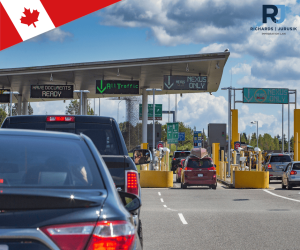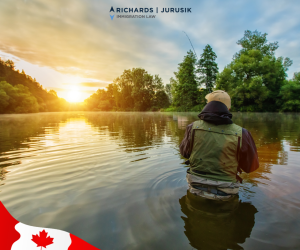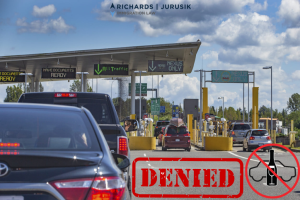Canadian Inadmissibility is a complex area of law requiring a skilled Canadian Immigration Attorney and in-depth knowledge of Canadian Immigration and Criminal Law. A Canadian immigration officer will decide if you can enter Canada when you:
- Apply for a visa or an Electronic Travel Authorization (eTA)
- When you arrive at a port of entry
Featured Videos for Canadian Inadmissibility for US Citizens
Why have I been denied entry to Canada?
Reasons for Canadian Inadmissibility
There are different reasons why you may not be allowed to enter Canada, including security, medical, or criminal reasons. US citizens with a criminal history are routinely turned back at the Canadian border as “criminally inadmissible.” Even people who have traveled to Canada for years without a problem can suddenly be refused entry for a past conviction. Just one misdemeanor conviction in the US can make a trip to Canada impossible without applying for relief.
Not all misdemeanor convictions make a person inadmissible to Canada, but some of the ones that do include:
- Drunk driving (DUI, DWI, DWAI, OVI, OWI, OUI, or DUAI
- Reckless driving
- Possession
- Assault
- Theft
- Shoplifting
- Fraud
- Sex offenses
- A felony or misdemeanor
- Other convictions
Based on what your sentence was and when it ended, a qualified Canadian Immigration attorney can compare the law under which you were convicted with the equivalent law in Canada to see whether the conviction is one that makes you inadmissible, and whether your offense is one that is considered “major” or “minor” criminality. They can also make this comparison and determine whether you are inadmissible BEFORE you travel.
How do I gain re-entry to Canada?
Temporary Resident Permits & Rehabilitation
If you are a US citizen that has been denied entry to Canada and/or are criminally inadmissible to Canada, you may be eligible to apply for relief to overcome your inadmissibility either permanently or temporarily.
There are three ways to overcome your inadmissibility and get permission to travel to Canada again.
Temporary Resident Permits (TRPs)
If five (5) years have not yet passed since the completion of your sentence, OR if you need to go to Canada urgently and can’t wait for a determination of rehabilitation, you can apply for a Temporary Resident Permit. A TRP is a temporary document that will allow you to enter Canada as long as you have a legal and valid reason. You must apply for a new permit each time you enter Canada.
- Temporary Resident Permits can be filed with the Canadian Consulate in your country of origin, where they can take a few months to process.
- A TRP application can be made at the country’s land or sea border, or at the airport customs, for a decision on the same day.
- Once your TRP is approved, you may be allowed entry into Canada multiple times for up to three years. However, it is only temporary and will need to be renewed if you wish to continue to travel to Canada.
TRP applications may take months to process at a cost of about $200 Canadian Dollars. To increase your chances of being approved for a TRP, you should seek the assistance of a skilled Canadian Immigration lawyer to help you gather and file all your relevant documents in advance.
Determination of Rehabilitation
If you plan on staying longer in Canada, applying for criminal rehabilitation provides a more permanent solution. You should apply for this option long before leaving to enter Canada. To qualify:
- You must have completed all conditions of your DUI sentence five (5) years or more prior to applying.
- You will be required to furnish certificates of your criminal record from every state you’ve resided in for over six months since you were 18 years old.
- You will also be required to submit all home and work addresses, including the dates you’ve lived and worked there.
You may apply for a determination of rehabilitation (using the Application for Rehabilitation, IMM 1444) if five (5) years have passed from the date of the completion of your sentence.
- These types of applications are filed with the Canadian Consulate, and can take up to 12 months to process.
- An approval of rehabilitation is permanent unless you re-offend.
Processing time for this application can take 12 months or more, and can cost anywhere from $200 to $1,000, depending on the seriousness of your offense. Once you are approved, you will be allowed permanent entry into Canada without the need to apply for another TRP, even if you’ve had a previous record.
To increase your chances of being approved for criminal rehabilitation, you should seek the assistance of a skilled Canadian Immigration lawyer to help you gather and file all your relevant documents in advance.
Deemed Rehabilitation
If your offense was minor in nature and you only have one offense on your record, you may be considered “deemed rehabilitated.”
- You must wait 10 years from the date of the completion of your sentence to be deemed rehabilitated. Nothing but the passage of time will qualify you for deemed rehabilitation, and once this happens you should be able to enter Canada without having to make an application.
- If your offense was a major offense, or if you have more than one offense, you will never be deemed rehabilitated, and an application will be necessary to overcome your inadmissibility.
Drunk Driving Offenses & Deemed Rehabilitation. Previously, Canada granted “deemed rehabilitation” status to those with a drunk driving conviction more than ten years old, allowing entry simply by the passage of time. That option no longer exists. Canada changed its Criminal Code in 2018 to make impaired driving a “serious offense.” It now considers any such activity in another country to be equally offensive or threatening to Canada.
We Can Help You Gain Re-entry to Canada
At Richards and Jurusik Immigration Law, we focus our legal practice on the Immigration and Nationality Laws of the United States. If you have been refused entry to Canada, were turned back at the border, or are unsure whether you are inadmissible, it is important to consult with a Canadian immigration attorney. We have extensive experience helping people who have been refused entry to Canada.
Download Our Canadian Inadmissibility Guide
Get our FREE comprehensive guide on entering Canada with a DUI or other criminal conviction, which details requirements and qualifications, the application process for Temporary Resident Permits (TRP) and Criminal Rehabilitation, strategies for overcoming inadmissibility, preparation tips for your application, what to expect at the border, post-entry considerations, common challenges and solutions, and resources and legal assistance.
Our Resources for Canadian Inadmissibility
Additional Outside Resources
- CANADA.CA: Find Out if You Need a Visa or an Electronic Travel Authorization (eTA) to Travel to Canada
- CANADA.CA: Reasons You May Be Inadmissible to Canada
- CANADA.CA: Rehabilitation for Persons Who Are Inadmissible to Canada Because of Past Criminal Activity
- CANADA.CA: Overcome Criminal Convictions
- CANADA.CA: Temporary Resident Permits
The Arrive Podcast
With 1 to 2 new episodes each month, the Arrive Podcast can help you stay updated on the US immigration matters that matter the most to you.
Our US Immigration Videos
Richards and Jurusik Immigration Law regularly creates video content about the current state of a certain aspect of US immigration law, and how it applies to Canadians living and working in the United States today.
Our US Immigration Webinars
Hosted by US immigration lawyer Jeremy Richards and other partners, our ongoing webinars provide opportunities for discussion and conversation about a variety of US immigration law issues.











